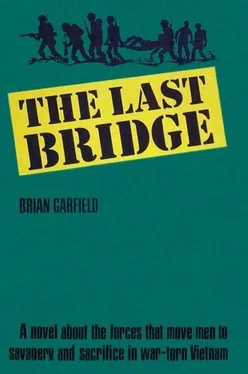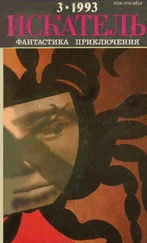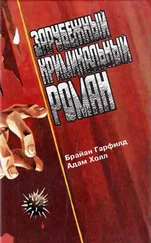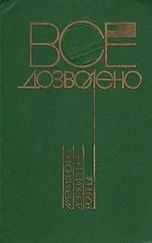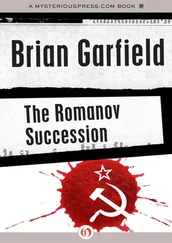Sergeant Hooker rammed past him and plunged into the jungle. Hooker came out, dragging Corporal Smith by the shirt collar. Smith was swallowing in spasms. Hooker flung the man down into the mud. Saville said, “Where were you?”
Tyreen said, “Never mind, Theodore. I had to make sure.”
“Make sure of what?” Saville was angry. He turned on Tyreen. “You should have let me know. For Christ’s sake, David!”
“If I’d warned you, you’d have looked out for him. You didn’t have time for that.” Tyreen slung his weapon over his shoulder. His face glistened with sweat. “I had you covered, Theodore.”
Corporal Smith lay breathing shallowly in the mud, full of misery. Tyreen said, “Pour him in the truck and let’s go. Sergeant Sun, you’ll drive.”
J. D. Hooker turned hotly. “Colonel, how many of us got to break before you quit trying to kill us all?”
Saville stepped across a dead Vietnamese and struck Hooker an openhanded blow across the face. Hooker spilled into the sawhorse and knocked it down. Saville took a step toward him, and Tyreen said gently, “Theodore.”
Hooker climbed to his feet and rubbed his jaw, not looking at anyone in particular. Saville said, “Drag these bodies off the road.” He picked up the sawhorse and threw it into the trees.
Sergeant Khang, saying nothing, helped Corporal Smith to his feet and led the man toward the truck. Saville squatted, braced a knee down, and yanked his knife out of a dead man’s chest. When he stood up he found Tyreen looking at him, and he said, “I was trying to remember how many years it took to learn where to put the knife to kill the man fast.”
“Easy,” Tyreen murmured.
Saville watched Corporal Smith get into the truck. He said, “David, the chances are if you swing too hard you’ll strike out. You had no right to take that chance with me.”
“I’m the master of this ship, Theodore. I had to know about him, and I didn’t have time to find out any other way.”
“Time,” Saville said. “God damn it, there are some things that just won’t happen as fast as you want, David. You can’t get nine women pregnant and expect a baby in one month.”
He stared at Tyreen, and the space between them became stuffed with a padded silence. Finally Tyreen said, “Let’s go.”
Nhu Van Sun climbed into the driver’s seat and sat staring at his hands on the wheel. It had not stopped raining. Saville took the heavy machine gun with him toward the back of the truck. Tyreen paused with one foot on the running board. “I had you covered, Theodore.”
“You said that before.”
Tyreen met his glance and climbed into the seat.
Saville tossed the machine gun into the truck bed and climbed in after it. He made a cursory effort to wipe some of the mud off his clothes. J. D. Hooker climbed in and looked at Corporal Smith, crumpled in a forward corner. Hooker said, “Captain, I doubt you’ll get a chance to court-martial me.”
“You’d better hope I do.”
“Yes, sir,” said Hooker. “But I think you and me both know the truth about the Colonel.”
The engine started up, and Saville braced himself against the tailgate. Sergeant Khang came away from Smith and said, “I guess he’s kind of shook up.”
“I guess he is,” Saville said.
“You ever get the feeling you’re about to roll boxcars, Captain?”
Saville did not answer him.
Chapter Nineteen
0915 Hours
McKuen paused to extract a handkerchief from his pocket and wipe his face dry. He sat astraddle the number two engine nacelle, with the cowling open and his hands grease-black. He felt a deep ache in his long back.
Mister Shannon stood on the metal-mesh runway below him, festooned with small arms. Rainwater dripped off the bill of Shannon’s cap. He said, “How about it, Lieutenant?”
“I’ll not be making any promises. I ain’t a bloody mechanic.”
“Can we get her airborne?”
“And what if we do?” McKuen snorted, and bent forward to bolt the cowling down.
Shannon started to talk again; McKuen paid no attention to the words until suddenly he shot upright and said, “Quiet.” He turned his head slowly to catch the warning sound again on the flats of his eardrums, and finally he found it, a faint buzzing hum in the sky. “Piston engines,” he said. A transport, or a lonely reconnaissance bomber. “Can’t see us through the soup, anyhow. And it’s thankful I am.”
He held on to that hope while the airplane noise advanced, growing louder in the obscure sky, until he knew the plane was close overhead. And thereupon the wingtip lights appeared over the mountain, vague within the clouds, moving smoothly across his range of vision. “Twin-engine Ilyushin,” he said. “Maybe fifteen hundred feet up. He’s looking for something.”
The plane changed course, moving in a slow circle. “Looking for us,” said Mister Shannon on the ground. They waited motionless with their heads thrown back. Rain slanted against their faces; McKuen blinked. The Russian-built search plane circled the mountains, moving in and out of view in the clouds; finally it zigzagged out of sight past the mountains, and McKuen said, “They didn’t spot us.”
“How do you know?”
“I don’t,” McKuen said. He slid back along the wing to the trailing edge and dropped to the ground. “I think maybe we ought to sit tight for a while. If we take off now, they’ll pick us up on radar — they’re waiting for us.”
Shannon said, “I’m hungry.”
“Anyone for pinochle?”
“Lieutenant.”
“What?”
“Suppose we get her off the ground. What then?”
“We point ourselves across the mountains and try like hell to get to Laos before the Reds can get fighters on our tail.”
“Lots of luck,” Mister Shannon said.
“Aye. And then some.” McKuen batted his arms together. “Let’s not be standing out here all day in this freezing bloody rain.”
Chapter Twenty
0920 Hours
Lieutenant Chinh sat guarding his tortured hands. He said irritably, “Why do they not come for us?”
“Trying to make us sweat,” said Eddie Kreizler.
The cell stank of sweat and human filth and the exhalations of twoscore raw-gummed mouths rotted by bad food. The crowded prisoners had made a circle of space for Kreizler and Chinh. No one spoke to them or looked at them; they were outsiders, even among prisoners — the American imperialist mercenary and the Vietnamese traitor to the people.
Lieutenant Chinh said, “I have think.”
“And?”
“I not do what you say.”
“I see,” said Kreizler.
“I am not a traitor,” Chinh said. “Not what you think.”
“I know you’re not a traitor, Lieutenant. I know you too well to think that.”
“This my country, not yours. But it is a sin, what you say. To kill self is a sin.”
“All right, Lieutenant.”
“They will torture me long time. Maybe they make me talk. But when I talk I tell lies.”
“Tell them the truth. Nothing you can tell them will hurt our side very much.”
“I heard radio talk. The Colonel Urquhart come. The paratroop attack. I lie to them about that.”
“They’ll know you’re lying, Lieutenant.”
Chinh had a stubborn look. He said, “What you do?”
“I’ll jump them alone. They’ll have to kill me.” He smiled. “I know — it sounds like a coward’s way out. Maybe it is.”
“No.”
I wish they’d get it over with , Kreizler thought. A rat scurried across someone’s legs and there was a feeble shout; someone threw a sandal at the rat. It broke for cover. Kreizler stood up and found spaces big enough for his feet; he crossed the room to the door and peered out through the open slot. His face seemed amiable and unconcerned. He put one hand against the cold iron of the door. Outside, within the restricted arc of vision, he could see a pair of sentries at the gate and the electrified wire fence that ran around the little jail. Beyond the fence, a squad of Vietminh guerrilla soldiers marched in ragged double file across the compound toward a supply shed. Lights burned in the headquarters building a hundred feet away. That was where they would interrogate him. He slid his mind away from that — they wanted him to think about that. The trick was to divorce mind from body. If you did not think about pain, you did not suffer.
Читать дальше
